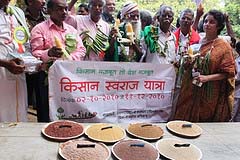 This pan-Indian outreach effort involved dialogues with tens of thousands of citizens, demanding that the nation should devote urgent attention to the continuing agricultural crisis and allocate highest priority to the agriculture sector, ending decades of neglect.
This pan-Indian outreach effort involved dialogues with tens of thousands of citizens, demanding that the nation should devote urgent attention to the continuing agricultural crisis and allocate highest priority to the agriculture sector, ending decades of neglect.
India needs a comprehensive policy which aims at making farming a viable livelihood for crores of medium, small and marginal farmers. This is essential for the nation's food security and for ensuring a vibrant rural economy as the backbone for a vibrant India.
The Alliance for Sustainable and Holistic Agriculture (ASHA), a network of individuals and organizations working to create an enabling environment for ecologically safe and economically viable sustainable agriculture has developed the contours of the proposed Kisan Swaraj Policy.
The new policy framework is based on the four pillars of economic sustainability of agriculture-based livelihoods, ecological sustainability to preserve the productive natural resources, people's control over agricultural resources including land, water, forest, seed and knowledge, in addition to ensuring non-toxic, diverse, nutritious and adequate food for all Indians.
agriculture-based livelihoods, ecological sustainability to preserve the productive natural resources, people's control over agricultural resources including land, water, forest, seed and knowledge, in addition to ensuring non-toxic, diverse, nutritious and adequate food for all Indians.
The specific demands and policy propositions in each of these areas are presented below -
Economic sustainability and income security for agricultural families
- Establish a mechanism to guarantee a minimum living income to farming families. Appoint a Farmers’ Income Commission as a statutory body which examines farmers' incomes every year and makes specific recommendations to ensure adequate income levels, including through remunerative prices and new policy options like direct income support;
- Recast methods of determining agricultural costs and prices to reflect the real cultivation costs (including correctly valued labour costs and farmers' own resources) as well as living costs that ensure a dignified living. The Minimum Support Price should be fixed to ensure at least fifty per cent profit over the real costs as well as to cover the living costs. Any reduction in this should be compensated as direct income support;
- Restructure the Food Security Systems to emphasize and ensure fair market to the farmers, for a variety of food crops;
- For all twenty five or more crops for which Minimum Support Price is declared, establish Market Stabilization Fund to ensure that the price is realized by farmers and protect them against market fluctuations;
- Invest in rural infrastructure through storage and processing units and financial support, for increasing farmers' holding capacity so that they can take advantage of the market;
- Direct subsidies to farmers: Support farmers' own inputs, especially in case of ecological farming, on par with external inputs through subsidies directly delivered to farmers;
- Provide a labour subsidy for farmers for 40 days/acre/season in irrigated areas and 60 days/acre/season in rainfed areas for various crops;
- Enact comprehensive social security legislation for all agricultural workers and farmers (including tenant farmers) to cover pensions, healthcare and accident/life insurance.
Ensuring ecological sustainability of farming
- Implement a time-bound plan to transition Indian agriculture to ecologically sustainable methods;
- Phase out all toxic agri-chemicals;
- Continue the moratorium on the commercial release of GM crops;
- Focus on rainfed agriculture and drought adaptation;
- Allocate fifty per cent agri-research funding immediately towards research on Ecological farming/sustainable agriculture using participatory approaches;
- The country's response to climate change and the National Mission on Sustainable Agriculture should focus on resilient systems, locally adapted varieties, and ecological farming practices along with increasing biodiversity, which will act as the best adaptation for climate change, instead of pursuing “climate-proof” GM crops.
Ensure protection of communities’ rights and resources
- Intellectual Property Rights of any form should not be allowed on seeds and seed producing technologies, and knowledge belonging to the farming community;
- Empower Government to regulate seed prices and royalties paid for technology licenses;
- Promote farmer-breeders and release farmer-bred varieties through the formal system;
- Promote community seed banks or seed centers at panchayat level for seed exchange;
- Stop forcible acquisition and diversion of agricultural lands, both rainfed and irrigated, to non-agricultural and non-food uses. The current Land Acquisition Act should be abolished and replaced by a pro-people Act based on prior informed consent. A mandatory land audit should be undertaken every five years;
- The Forest Rights Act should be implemented effectively;
- Privatization of water resources should be stopped and re-prioritization of water usage across sectors should be taken up, prioritizing drinking water and agriculture. Also, small water bodies such as tanks should be developed and maintained under community control;
Ensure safe, nutritious, diverse and adequate food for all
- Phase out all toxic technologies in farming so that the right to safe food for all Indians is safeguarded;
- Recast all food security schemes including the PDS into universal and decentralized systems of local production, procurement, storage and distribution, while including millets, pulses and oilseeds as an integral part;
- Ensure that consumers’ right to informed choices with regard to chemical residues and GM foods is ensured through proper standards and labeling regimes.
For more information on the Kisan Swaraj Policy, as well as for contributing to the process of evolving this policy, please contact:
Address: ASHA, A-124/6, First Floor, Katwaria Sarai, New Delhi 110 016,
Phone/Fax: 011-26517814
Website: www.kisanswaraj.in
Contact Persons:
Kavitha Kuruganti: 09393001550, kavitha_kuruganti@yahoo.com
GV Ramanjaneyulu: 09000699702, ramoo.csa@gmail.com
Kirankumar Vissa: 09701705743, kiranvissa@gmail.com
The document can be downloaded below -





 Towards_a_Kisan_Swaraj_Policy_ASHA_2010.pdf
Towards_a_Kisan_Swaraj_Policy_ASHA_2010.pdf







